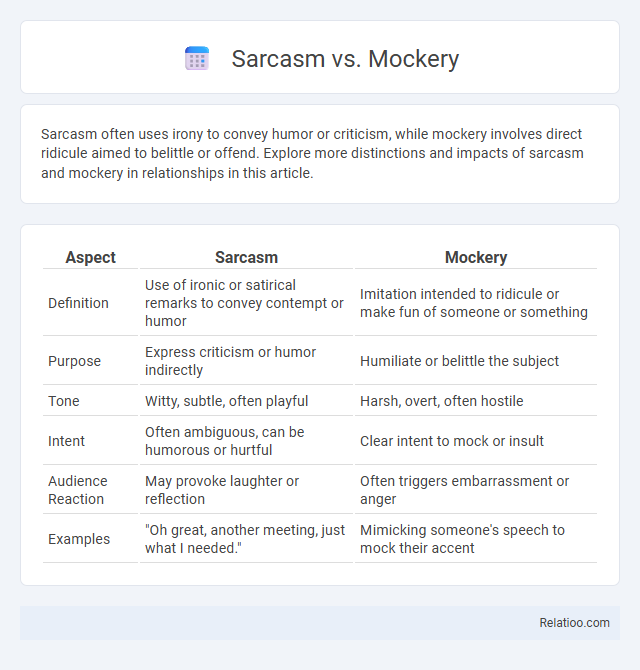Sarcasm often uses irony to convey humor or criticism, while mockery involves direct ridicule aimed to belittle or offend. Explore more distinctions and impacts of sarcasm and mockery in relationships in this article.
Table of Comparison
| Aspect | Sarcasm | Mockery |
|---|---|---|
| Definition | Use of ironic or satirical remarks to convey contempt or humor | Imitation intended to ridicule or make fun of someone or something |
| Purpose | Express criticism or humor indirectly | Humiliate or belittle the subject |
| Tone | Witty, subtle, often playful | Harsh, overt, often hostile |
| Intent | Often ambiguous, can be humorous or hurtful | Clear intent to mock or insult |
| Audience Reaction | May provoke laughter or reflection | Often triggers embarrassment or anger |
| Examples | "Oh great, another meeting, just what I needed." | Mimicking someone's speech to mock their accent |
Understanding the Essence of Sarcasm
Sarcasm is a form of verbal irony where the speaker says the opposite of what they mean to convey humor or criticism, often relying on tone for clarity. Unlike mockery, which aims to ridicule or insult someone directly, sarcasm can be subtle and layered, requiring contextual understanding to grasp its intent. To effectively use sarcasm, your awareness of tone and context is essential, as this ensures that your message is perceived as witty rather than offensive.
What Defines Mockery?
Mockery is defined by its intent to ridicule or belittle someone through imitating or exaggerating their behavior, often aiming to provoke humiliation or disdain. Unlike sarcasm, which uses irony or sharp wit to convey contempt or humor subtly, mockery directly targets the subject with overt derision. Understanding these distinctions helps you recognize when humor crosses into harmful territory, affecting social dynamics and emotional well-being.
Key Differences Between Sarcasm and Mockery
Sarcasm involves using irony to convey contempt or humor, often with a tone that implies the opposite of the literal meaning, while mockery specifically aims to ridicule or belittle someone or something by exaggerating flaws or imitating behavior. Sarcasm relies heavily on vocal tone and context for interpretation, making it subtle and sometimes ambiguous, whereas mockery is more overt and direct in its intent to offend or humiliate. Understanding these differences is crucial in communication to avoid misinterpretation and to gauge the social dynamics involved accurately.
Psychological Impact of Sarcasm
Sarcasm often involves sharp, witty remarks that can mask underlying criticism, impacting psychological well-being by triggering feelings of confusion or self-doubt. Unlike mockery, which explicitly humiliates or belittles, sarcasm may be perceived as playful or hostile depending on context, influencing emotional responses such as anxiety or defensiveness. Repeated exposure to sarcasm in communication can erode trust and increase stress, leading to long-term effects on self-esteem and interpersonal relationships.
Mockery: A Tool for Humiliation?
Mockery serves as a potent tool for humiliation by exaggerating or imitating someone's behavior or traits to provoke ridicule and shame. Unlike sarcasm, which often relies on irony to convey contempt or humor subtly, mockery directly targets and belittles its subject, making it more aggressive and harmful. Your understanding of social interactions deepens by recognizing how mockery's intent to demean can damage relationships and self-esteem.
Sarcasm in Everyday Communication
Sarcasm in everyday communication often serves as a nuanced form of humor or criticism, relying on tone and context to convey meaning opposite to the literal words. Unlike mockery, which explicitly aims to ridicule or belittle, sarcasm can range from playful teasing to biting remarks without necessarily intending harm. Understanding sarcasm involves recognizing vocal cues and situational factors, making it a complex but common element in social interactions.
Mockery in Social Dynamics
Mockery plays a significant role in social dynamics by subtly undermining an individual's status or opinion through ridicule, often masking hostility with humor. It differs from sarcasm, which typically uses sharp or cutting remarks to convey contempt, while mockery focuses more on imitation or exaggeration to belittle. Understanding these nuances helps you navigate social interactions more effectively, recognizing when mockery is used to assert dominance or influence group behavior.
Cultural Perspectives on Sarcasm and Mockery
Cultural perspectives on sarcasm and mockery vary widely, influencing how these forms of expression are perceived in social interactions. Sarcasm often requires a shared understanding of subtle linguistic cues, which may be misinterpreted in cultures that favor direct communication, while mockery tends to be viewed more negatively across most societies due to its overtly critical nature. Your ability to navigate these differences can improve communication and avoid unintentional offense in multicultural settings.
Recognizing Sarcasm vs. Mockery in Conversation
Recognizing sarcasm versus mockery in conversation hinges on intent and tone; sarcasm often employs irony to convey humor or criticism subtly, while mockery aims to ridicule or belittle directly. Sarcasm typically uses exaggerated or opposite statements to imply the true meaning, making context and vocal cues essential for accurate interpretation. Understanding these nuances enhances communication by preventing misinterpretations and fostering clearer social interactions.
Navigating the Fine Line: When Does Sarcasm Become Mockery?
Sarcasm becomes mockery when it shifts from clever, ironic remarks to hurtful or demeaning expressions targeting an individual's character or traits. Navigating this fine line requires awareness of intent, tone, and context, as sarcasm aims to amuse or criticize indirectly, while mockery intends to belittle or humiliate. Understanding social cues and the recipient's perception is crucial in distinguishing playful sarcasm from offensive mockery.

Infographic: Sarcasm vs Mockery
 relatioo.com
relatioo.com